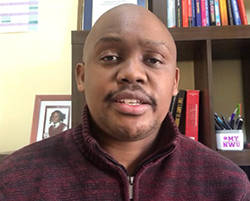Dr Tshepang Molale, an academic in the North-West University’s (NWU’s) Faculty of Humanities, recently published a chapter in the book Development, Economics and Management, investigating the instability and unsustainability of African language newspapers.
This chapter, co-authored with Dr Philip Mpofu, a postdoctoral research fellow in the Indigenous Language Media in Africa (ILMA) research niche area, used a Mahikeng-based local newspaper – Mmegi Dikgang – as an example.
According to Dr Molale, this study evaluates to some extent the implementation of constitutional provisions, which puts African languages at par with English – particularly in newspaper publishing.
“The study shows why it is difficult to promote African languages in the press amid the postcolonial hangover and market model of the media,” he says.
“While the rise and demise of African language newspapers from colonial to post-independence Africa is documented, Mmegi Dikgang started as an African language newspaper and later metamorphosed into an English language newspaper.”
Dr Molale says Mmegi Dikgang’s transition is due to the understanding of the imperative of African language media, the language question, especially the English-African language debate in public domains, and the performance of African language press in colonial and post-independence South Africa.
“This shows that the English hegemony with colonial roots is the fulcrum for the struggle of African language newspapers.”
“English is established as the language of commerce, politics, education, parliament, among other domains. It is the established language of journalism and news. Hence, all the justifications for the poor performance of African language newspapers are hinged on the dominance of the English language newspapers, which enjoy the lion’s share of the readership,” he adds.
In this chapter Dr Molale and Dr Mpofu argue that having African language publishing and distribution in English hegemony is antithetical to the goal of promoting previously marginalised African languages. They say Mmegi Dikgang should take a leaf from other African language newspapers, such as Ilanga and Isolezwe, on how they survived the relentless competition of English language newspapers.
Prof Abiodun Salawu, director of the ILMA research niche area and editor of African Language Media and Development, Economics and Management – in which this chapter is featured – says this study is a vital contribution to the rarely existing literature on the development and sustainability of African language newspapers in South Africa, and Africa in general.
“It provides insights into understanding the volatility of African language publishing, and the historical, linguistic and economic factors that impact the initiation, growth and sustainability of African language press in post-independence Africa,” says Prof Salawu.
|
|
|
|
Dr Tshepang Molale |
Dr Philip Mpofu |


